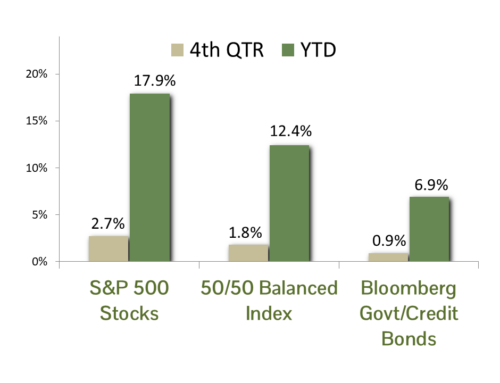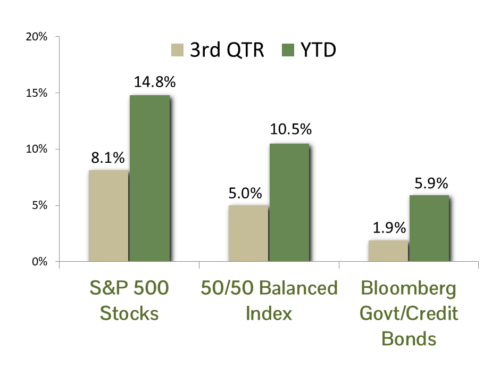Frequently we get the question of why we buy a stock, along with the related question of why did we sell a stock (or maybe more often, why didn’t you sell that dog?). We produced a detailed piece recently which addresses several bigger picture investment themes https://ccminc.com/commentary/ccm-equity-strategy-update/ but the objective of this article is to delve into the question of what is a stock and what are the investment merits that attract us to ownership.
Fundamentally, all stocks are simply ownership stakes in a company that produces a product (and hopefully makes money in doing so). As simple as this seems, it is a critical concept for long term investors to keep in the forefront of their mind. The only difference between owning shares in CVS, for example, and being the owner of a local drug store is the scope of the business. CVS obviously has many more stores (9,941 as of the end of 2019) and other lines of business, such as insurance, but it is the same principle. Both sell product with the appropriate mark up to cover the cost of goods sold and overhead to provide the owner(s) with a profit and return on investment.
With that basic concept in mind, the question then becomes, what is an ownership stake – a share of stock – worth? Literally, libraries of books have been written on this particular topic, including some of the foundational works of finance and investments such as The Intelligent Investor by Benjamin Graham. Delving into the detail of such works is beyond the scope of this article, but the essence of research boils down to two basic questions:
- how much net income does a company produce and
- how much are investors willing to pay for that stream of income?
The first point essentially goes back to what a business should produce, i.e. income to its owner(s). While that concept seems very straight forward, it can be relatively challenging to estimate. Financial accounting gives us an excellent view of what has happened in the past (actually in excruciating detail if one is willing to dig into the quarterly and annual statements produced by companies). However, those only give investors a hint as to what revenues and income will look like in the coming years. In order to derive such expectations, potential investors must make estimates of sales and forecasts of expenses. Furthermore, these estimates must be considered in the context of the capital that a company has available to drive those estimates – that is, the balance sheet to support those estimates. Despite the fact that forecasting future income involves making estimates, the result is relatively concrete and anchored in reliable historical data.
The second point, however, is much more of a measure of interest rates and investor psychology in particular. In its simplest form, analysts measure investors’ willingness to pay for an income stream by the Price to Earnings (P/E ratio). Financial theory tells us that an asset, whether it is a stock, bond or real estate, is worth the net present value (NPV) of the income it produces plus the value of the asset when it is sold. The NPV basically looks at the income stream in the future and calculates what that stream is worth today, discounted by some interest rate. Thus, stock values are influenced by interest rates. All else equal, stocks should be worth more in a low interest rate environment than a higher rate environment.
While discounting future income streams is relatively mechanical, investor psychology on the other hand, is highly subjective. Experience and research has shown that the actions of humans are highly influenced by emotions that may be irrational at times. We see this in our everyday lives as mood swings govern our behaviors. For example, a person feeling confident about the future is likely more willing to purchase a new car than if they were faced with uncertainty. Similar psychology weighs on investment decisions. Investors receiving a steady stream of good news are much more willing buyers of stocks, which tends to cause prices to increase. One can see the waxing and waning of investor psychology reflected in P/E ratios. Enthusiastic investors will bid the price of stocks up, causing P/E ratios to expand. On the other hand, when faced with bad psychology, prices drop, with a resulting shrinkage in P/E ratios.
One must keep in mind that the above discussion is simply a framework, and there can be radical divergences from what seems to be a rational price for a stock. The framework makes good sense when looking at a larger well established company such as Merck. Merck produced annual income of $3.81/share in 2019 and trades at an historical P/E of 18.0. Investors believe that earnings will increase and have it bid at a 14.9 forward P/E (which implies annual earnings of $5.53/share).
How then, to evaluate a stock like Tesla that has never had a profitable year, yet the stock trades for $429/share? Of course, Tesla sales have grown dramatically – from $7 billion in 2016 to almost $25 billion in 2019 – yet it still loses money. Financial theory would tell us that investors are making the assumption that Tesla will someday start producing net income – and a lot of it! (Point 1 above). However, the enthusiasm for electric cars and the fact that the stock has been on a tear has produced a psychology in which investors are willing to ignore stark realities. Tesla investors may indeed be correct, but they are on some level, suspending reality, and, at least in the short term, buying on the notion that there will be a greater fool willing to buy their shares at a higher price.
The CCM philosophy on stocks is to purchase good companies with solid franchises and established earnings records. Equity investing in our view is a long haul exercise which biases us toward companies with these characteristics. It may mean that we miss on some of the hottest new ideas, but our experience has been that for every such winner, the street is littered with companies that were yesterday’s new invention. Similarly, enthusiasm for stocks as reflected in the P/E ratio waxes and wanes as investor psychology changes. However, part of our role as investment managers is recognizing that investing in stocks is a long term decision rather than a short term trading proposition. With that in mind, purchasing good companies at the right time has proven to be a profitable strategy for our clients.



